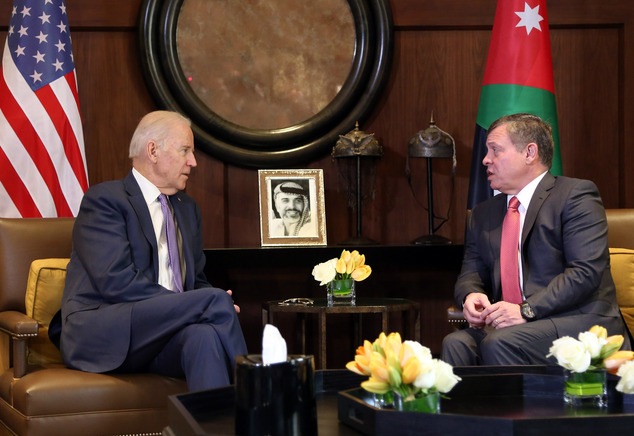
The first Arab leader set to meet US President Joe Biden in Washington is King Abdullah II of Jordan and this is no coincidence, the now shaky relationship between the once closest Arab ally of the West is not something the President is looking to further destabilize.
Up until 2015, in the advent of the rise of Crown Prince Mohammed Bin Salman of Saudi Arabia, Jordan was easily the most reliable of Arab regimes which remained in the pockets of the West. However, as the Trump administration’s neoconservative agenda sought to place more importance on Saudi Arabia, the King of Jordan quickly grew uneasy with his once friendly neighbors and puppet masters.
In early April of this year, it was revealed that an alleged coup attempt had taken place in the kingdom; involving King Abdullah’s half brother and former Crown Prince Hamzah Bin Hussein, tribal leader Sharif Hassan Bin Zaid and Bassem Awadallah, a close confidant to Mohammed Bin Salman of Saudi Arabia.
It has now been claimed by an unnamed former Western Intelligence officer, quoted by the Washington Post, that an internal Jordanian report concluded that the detained plotters in April, “do not amount to a coup in the legal and political sense, but they were an attempt to threaten Jordan’s stability and incite sedition”. This would affirm some of the original claims made by Jordanian authorities at the time.
The plotting against the King of Jordan did not begin this year however, in fact the policies of the Trump Administration – aligning with Trump’s “Deal of the Century” plan for the region – had sidelined Jordan and Egypt greatly in favor of the UAE and Saudi Arabia. During the neoconservative Trump era, great power plays were made in the region to put Abu Dhabi and Riyadh in stronger positions, even at the expense at the often US allied Muslim Brotherhood aligned Qatar.
When Jordan had made it clear that it would not play ball with isolating Qatar, the way Saudi Crown Prince Mohammed bin Salman had expected, and Amman had attempted to help facilitate peace talks with Yemen’s Ansarallah, the Saudi Kingdom started applying pressure on Jordan. Just as was the case with the Kingdom of Morocco, which had been bullied by the UAE after not taking a strong enough stance against Qatar in line with the Saudi blockade, it was probably thought to have been politically prudent by the Saudis to follow a similar strategy with Jordan.
As it became clear that Saudi Arabia was heading towards the path of normalizing its ties with Israel, perhaps paving the way for trade and infrastructural projects such as the ‘new Hejaz railway’, Jordan had itself become further removed. This was largely due to Jared Kushner’s presentation of a different status for Jerusalem, as part of the so-called “Deal of the Century” “peace plan” proposal.
The Jordanian monarch currently has quasi power over maintaining the al-Aqsa mosque compound in Jerusalem’s old city, and any threat to that status quo is seen as unacceptable to King Abdallah, whose ancestors once ruled over all three of Islam’s holiest sites. The idea was even being speculated that perhaps Saudi Arabia was vouching for some sort of deal to transfer the responsibility for the upkeep and security at al-Aqsa to them.
Israeli officials have also alluded to the possible support of former Israeli Prime Minister, Benjamin Netanyahu in an attempt to stir tension in Jordan and possibly the removal of King Abdullah, with his replacement being Prince Hamzah. This is whilst the likes of Benny Gantz and many other high ranking Israeli officials have openly expressed their solidarity with Jordan’s King and have vouched for stability.
Despite King Abdullah II’s father having signed a peace deal with Israel in 1994, and having remained completely complicit through inaction whilst Palestinian land was usurped by settlers, Jordan has consistently vouched for a two-state solution.
Earlier this month the Hashemite ruler King Abdullah stressed his urgency over the need for dialogue in order to reach a two-state solution and also indicated that there is a conspiracy to undermine both the stability of Jordan and the Palestinian cause.
During last month’s Palestinian uprising over Israeli violations against Jerusalemites and armed incursions into al-Aqsa mosque by Israeli forces, Jordanian parliamentarians and officials seemed much more fiery than usual in their tone when discussing Israeli violations. Jordan’s military also sat back and watched as demonstrators crossed over their border with Israel in protest of the attacks on Gaza. Around a week later an armed clash occurred between the Jordanian military and Israeli military, which Israel’s army admitted caused an injury to one of its soldiers.
Jordan’s society has also taken a more hands on approach towards combating Israel, and the Hashemite Kingdom deals with it. Earlier this month, demonstrators organized to shut off their power supplies, reportedly costing a state-run Jordanian electrical company hundreds of thousands, demanding that the country end its gas importing deal with Israel.
It now seems as if the US Biden administration will attempt to salvage the US relationship with Jordan, but if their Saudi allies continue to persist with stirring tensions, Jordan may end up posing many problems for Israel in the future. Jordan is a close ally of the West, but internal pressures do make a difference and there are redlines that cannot be passed. It has been demonstrated now that King Abdullah will not simply sit back and allow foreign backed plots in his country, and this change in mood from Jordan has proven a wild miscalculation by the United States government.
 RSS Feed
RSS Feed















 June 17th, 2021
June 17th, 2021  Awake Goy
Awake Goy  Posted in
Posted in  Tags:
Tags: 













